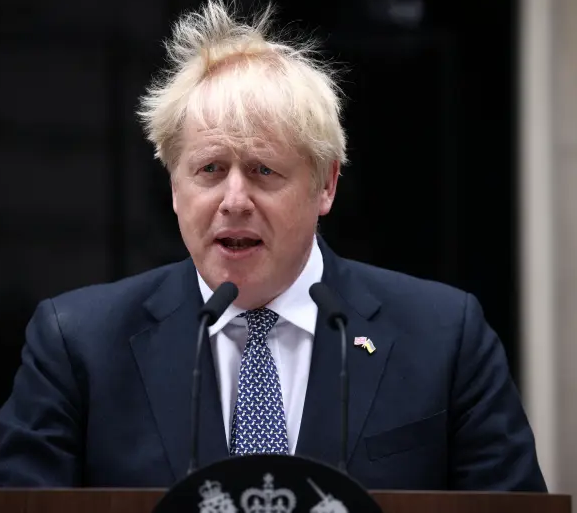Two senior cabinet ministers resigned on Tuesday, causing more than 40 senior and junior ministers to follow on Wednesday.
UK Prime Minister Boris Johnson announced his resignation as leader of the Conservative Party on Thursday after 54 of his ministers quit since Tuesday.
“It is clearly now the will of the Conservative Party that there should be a new leader for the party,” he said in a speech outside of 10 Downing Street. “That process should begin now.”
“I know that there will be many people who are relieved and I want you to know how sad I am to be getting out of the greatest job in the world.
Johnson said that a timetable for the next steps the party will take will be released next week, but in the meantime, he will remain prime minister until a new party leader is elected.
The news was welcomed by the head of the Labour Party Keir Starmer who said that “it should have happened a long time ago.”
“[The resignation] should have happened a long time ago.”
Head of Labour Keir Starmer
Johnson “has been responsible for lies, scandal and fraud on the industrial scale,” he added.
He also demanded that there be an election immediately and that the Labour Party would call a vote of no confidence if there wasn’t.
Johnson’s deputy head in the Conservative Party Justin Tomlinson said that he was “team Boris” but that the resignation was “inevitable.”
After two senior cabinet ministers and several junior ministers resigned on Tuesday, a string of senior and junior ministers announced their resignations on Wednesday, bringing the total number of resignations to 54 on Thursday morning as well as one minister that Johnson fired.
Additionally, two lawmakers submitted letters of no confidence against Johnson on Wednesday, while MP Nadhim Zahawi, who was appointed by Johnson as finance minister on Tuesday sent out a letter on Thursday demanding that Johnson step down.
A string of scandals
The resignations come after a series of scandals related to Johnson came to light in the last few months that have called his ability to lead the country into question for many ministers, most notable “Partygate” in which it was revealed that Johnson had hosted multiple garden parties at 10 Downing Street while the rest of the country was in COVID-19 lockdown.
Johnson was expected to be ousted via a no-confidence vote the Conservative Party took in June, but he survived the vote, meaning that according to current law, another no-confidence vote could not be attempted for another 12 months.
However, it became too much for many ministers after Johnson knowingly appointed MP Chris Pincher, who had been accused of sexual misconduct in the past, to a senior position in the House of Lords whips’ office. A few months after his appointment, Pincher was accused by two men of drunkenly groping them, but Johnson refused to suspend him from the party even though it was revealed that he had known about the past incidents.
A few days after the Pincher scandal broke, two cabinet ministers resigned, saying they could not remain in their positions in good conscience due to the latest scandal, setting off the resignations of many others.
Johnson refuses to resign
Despite the resignations and many calls for him to resign himself, Johnson announced that he had no intention of resigning because he believed his job was to keep going in a Prime Minister’s Questions (PMQ’s) session in the House of Commons on Wednesday.
“The reason I have fought so hard was not just because I wanted to,” he said in his resignation speech. “But because I thought it was my job, my duty and my obligation to you.”
Many disagreed with this decision to keep going on Wednesday including Attorney-General Suella Braverman who called on Johnson to resign on Wednesday night and announced that she would run to replace him.
The Conservative Party will need to replace Johnson in a process that could take a few months. Once a new party head is elected, they will become interim prime minister and could choose to call a snap election if they chose
